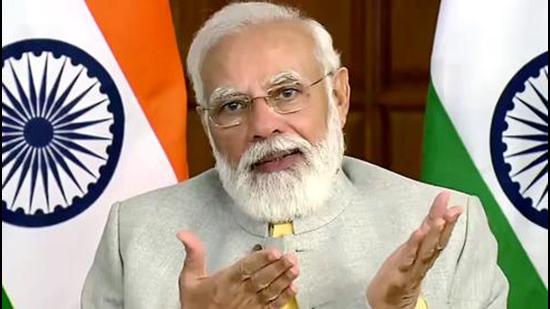PM Modi draws up blueprint for financial inclusion, asks bankers to be proactive
The Prime Minister asked bankers to become proactive and instead of waiting for the customer to visit them, he suggested they should approach people who need finances.
Prime Minister Narendra Modi on Thursday asked bankers to shun their age-old “approver-applicant” attitude and make customers their partners in progress by stepping up the government’s financial inclusion initiatives and proactively reaching out to small entrepreneurs. The bankers, he emphasized, should also show willingness to invest in new ideas for the country’s inclusive economic development.

PM Modi said the Indian banking sector is robust due to several reforms undertaken in the last six-seven years, which helped to provide immediate relief to millions of poor though instant transfer of money in their ‘Jan-Dhan’ accounts. He was addressing a conference on ‘Creating Synergies for Seamless Credit Flow and Economic Growth’ in the capital.
He said, banking sector reforms undertaken during his regime not only unearthed hidden huge non-performing assets (NPAs) but also recovered about ₹5 lakh crore from willful defaulters, and another ₹2 lakh crore stressed assets will be resolved through recently created National Asset Reconstruction Company Ltd (NARCL).
A transparent Asset Quality Review (AQR), undertaken during the Modi government’s tenure in 2015, gross NPAs of public sector banks (PSBs) soared from ₹2,16,739 crore on March 31, 2014 to ₹8,95,601 crore in March 31, 2018 mainly due to indiscriminate lending to unscrupulous influential people such as Vijay Mallya in the past. After the government’s four ‘R’ strategy – recognition, resolution, recapitalisation and reforms – it went down to ₹6,16,616 crore on March 31, 2021, according to official data.
The Prime Minister said the government has strengthened banks by recapitalising them and transparently resolving their NPA issues that included transformative legislation -- the Insolvency and Bankruptcy Code (IBC). “Today, Indian banks have become so strong that they are capable of energising the economy of the country, to give it a big push. They can play a big role in making India self-reliant,” he said in Hindi.
He asked bankers to become proactive and instead of waiting for the customer to visit them, they should approach people who need finances. “You must shun the feeling that you are an approver and the person in-front of you is an applicant, and banks must adopt the partnership model,” he said.
PM Modi underscored the importance of using data to enhance business and improve services. He gave the example of Goods and Services Tax (GST) data that capture financial history of an entrepreneur, which banks should leverage to proactively reach out to scrupulous businessmen who may need funds to further expand their businesses.
Recalling his school-days, when banks were not nationalised and the private bankers used to visit schools explaining the importance of opening a bank account to children, he said public sector banks should not wait for their customers to visit them, instead bank branches must approach at least 10 local micro, small and medium enterprises in their vicinity and offer financial help and advice to enhance their businesses. “This is the time when banks should act as wealth creators and job creators, which will help in enhancing the country’s balance sheet,” the PM said.
This is possible, he said citing the example of one of the world’s largest financial inclusion initiatives – ‘Jan-Dhan’ accounts. India could accomplish this because of dedication of executives working in public sector banks, he added. “The initiative paid off during the pandemic as it ensured that no poor person was left hungry during the period,” he said.
The Covid-19 pandemic hit India in March 2020 and led to a 68-day nationwide lockdown. During this period the government released free food grains and financial assistance to the poor. The financial assistance went directly to the ‘Jan-Dhan’ accounts of the beneficiaries at the click of a button.
Get Current Updates on India News, Lok Sabha election 2024 live, Election 2024 along with Latest News and Top Headlines from India and around the world.



